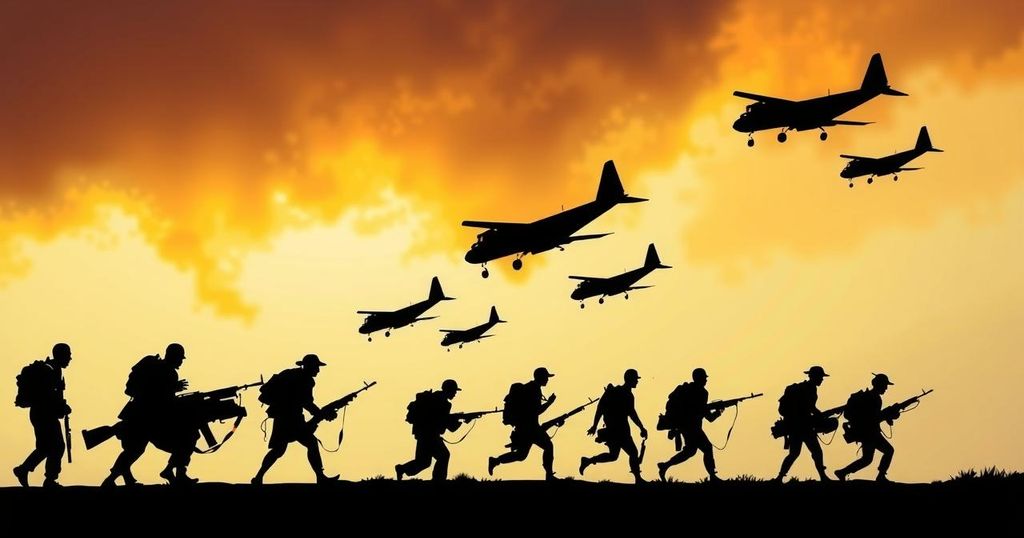The remains of 42 South African freedom fighters have returned home from Zimbabwe and Zambia, marking a significant governmental initiative to honor those who perished in exile during the anti-apartheid struggle. The ceremony at Waterkloof Air Force Base was attended by family members and officials, with a homecoming ceremony scheduled by President Cyril Ramaphosa before the remains are handed to their families for reburial.
JOHANNESBURG — On Wednesday, the remains of 42 South African freedom fighters, who had perished while in exile in Zimbabwe and Zambia during the anti-apartheid struggle, returned to their homeland. Government officials and family members received the remains at the Waterkloof Air Force Base in Pretoria after their exhumation in the aforementioned countries, where they had been temporarily laid to rest. This repatriation forms part of a governmental initiative designed to provide closure to the families of those who lost their lives abroad while engaged in the underground resistance movements of both the African National Congress (ANC) and the Pan Africanist Congress (PAC). In the prelude to the end of the apartheid system in South Africa in 1994, numerous activists sought training and military preparations outside the country, with many gravitating towards Zimbabwe and Zambia, where the anti-apartheid movements had significant footholds. The ANC, under the leadership of Nelson Mandela, previously maintained its headquarters in Lusaka, Zambia, after being outlawed in South Africa. During this period, many freedom fighters perished far from their homeland and were interred in foreign soil. Among those whose remains were returned to South Africa were notable figures including Duma Nokwe, Florence Mophosho, and Basil February. During a Heritage Day celebration, Deputy President Paul Mashatile highlighted that the effort to repatriate these remains serves as an educational endeavor for future generations, shedding light on the contributions of countless individuals in the struggle against apartheid. “As a national memory project, this initiative aims to commemorate, celebrate, educate, promote, preserve, conserve, and provide a durable testament to South Africa’s road to freedom,” stated Deputy President Mashatile. A ceremonial welcome led by President Cyril Ramaphosa is scheduled for Friday, where the repatriated remains will be formally handed over to their respective families for reburial across South Africa. Furthermore, the government has indicated its pursuit of repatriating additional remains from various countries, including Lesotho, Ethiopia, Tanzania, Angola, and Russia. “I hope this process will culminate in getting more people in other countries who died under difficult conditions. We welcome them back to connect with their families,” commented Deputy Defense Minister Bantu Holomisa.
The return of the remains of South African freedom fighters symbolizes a significant gesture of recognition and respect for those who fought against the apartheid regime. Many of these individuals were forced into exile as oppressive conditions within South Africa made it perilous to conduct their anti-apartheid activities. Countries such as Zimbabwe and Zambia became key locations for military training and organization of resistance, particularly for members of the ANC and PAC, both pivotal in the eventual dismantling of apartheid. The repatriation initiative aims not only to honor the memories of these freedom fighters but also to educate contemporary and future generations regarding the sacrifices made during this critical period in South African history.
In conclusion, the repatriation of the remains of 42 South African freedom fighters is a monumental step towards honoring the legacy of those who fought against apartheid. This initiative, backed by government officials and family members, underscores the importance of remembering and teaching future generations about the struggles endured in the pursuit of freedom. With the ongoing efforts to repatriate more remains from various countries, the initiative reflects a broader commitment to acknowledge the sacrifices of many who contributed to South Africa’s historical fight for liberation.
Original Source: www.newsday.com






